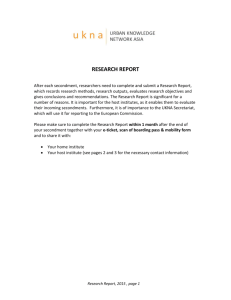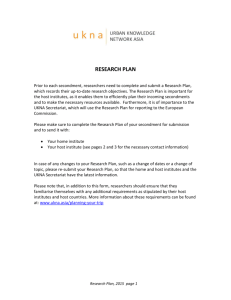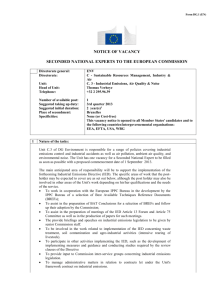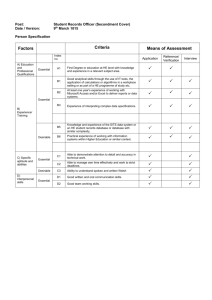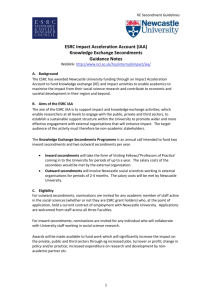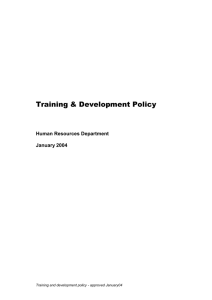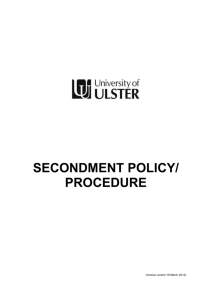Secondment Policy - University of Warwick
advertisement
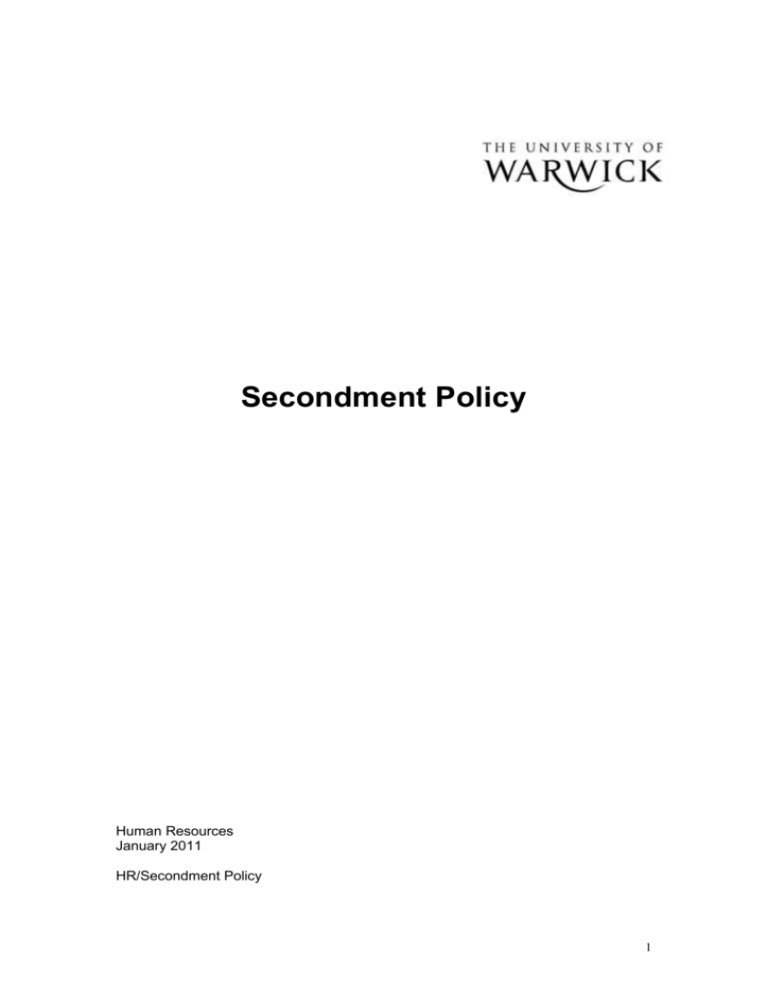
Secondment Policy Human Resources January 2011 HR/Secondment Policy 1 1.0 AIM 1.1 The University as an institution of learning and development is committed to ensuring the careers of our staff are also developed as fully as possible. As part of our approach to managing talent and succession planning, secondment opportunities (i.e. undertaking work in another area of the University, or outside the University, for a specified time period, sometimes in a post at a higher grade, with increased or new areas of responsibility) are encouraged. Internal Secondments are used when a University employee is being temporarily located in another part of the University with a view to returning to their substantive post at the end of the period. 1.2 The University recognises secondment opportunities as; developmental for the individual; an additional means of advancing career paths; adding to the skills base of the organisation; an opportunity to build or develop relationships with other organisations or internal departments; 1.3 This policy is not intended to be prescriptive but to facilitate the development of our staff to the benefit of both the individual and the University. 2.0 APPLICATION 2.1 This policy applies when the University identifies an opportunity which may be offered as a secondment. Alternatively it can be applied when an employee identifies a role for which they would like to be considered on a secondment basis. It is recognised that each secondment opportunity differs dependant upon the individual secondment arrangements and therefore the full terms of this policy may not apply in all circumstances. The exact details of the individual secondment arrangements will therefore be specified in the secondment contract. 3.0 PRINCIPLES 3.1 One of our values at University of Warwick has always been on developing self and others in order to demonstrate the highest standards of performance and secondments are seen as one of a number of tools available to achieve this. 3.2 Managers therefore will use their professional judgement in line with the strategy and values of the University when considering secondment opportunities. 3.3 If a secondment is not within their own department, Managers of the substantive department should consider whether it is possible to release the individual from their current role for the requested time period, considering the needs of the department, the development needs of the employee and the department’s ability to ensure that the employee can return to the substantive role and the requirements of the organisation. 3.4 If an individual’s request for a secondment opportunity is refused, a review of the decision can be sought from the next management level up from the 2 original decision maker. This is likely to be the Head of Department in most cases. This decision is final and should be based on the areas listed under 3.3 4.0 THE PROCESS 4.1 INTERNAL SECONDMENTS 4.2 The University reserves the right to identify secondment opportunities for individuals in line with the University or departmental needs and/or developmental needs of the individual. Such opportunities may not be advertised. 4.3 The filling of a vacant post by a secondment allows the secondee to broaden and develop their experience while retaining the offer of a return to their substantive post at the end of the secondment. 4.4 The Head of Department of the seconding department must agree in advance that the substantive role (or an equivalent role) can be retained for the employee. 4.5 For situations where the individual is approached by the University to undertake a specific task or work for a specified period (i.e. for succession planning or career development purposes) the secondment might extend beyond 2 years. In such cases the University may agree to protect the substantive post for an extended period and the terms of secondment will be no less favourable than specified in this policy. The details of these arrangements would be specified in the individual’s contract of employment. 4.6 If the secondee covers a post at the same grade level, no change is made to the existing pay and terms and conditions. 4.7 If the secondee covers a post at a higher grade level as part of a development plan, the secondee would normally be offered a ‘development rate’ equivalent to 50% of the difference between their rate of pay and the bottom of the next grade. 4.8 If the secondee as part of a development plan wishes to undertake a secondment in a role at a lower grade, the secondee would be expected to move to the pay, terms and conditions of the secondment post. 4.9 In circumstances where the secondee, based on previous skills and experience or experience gained within the secondment is able to carry out the full remit of the role with limited supervision the secondee would be expected to move to the pay, terms and conditions associated with the secondment post. 4.10 A secondment allowance representing the difference between the secondee's substantive post and the seconded post may be paid as an alternative, although this would be non pensionable. This would be appropriate where undertaking the secondment could result in an individual having to change pension schemes, which could be detrimental upon return to the substantive role. 3 4.11 Guidance should be sought from the link HR Adviser.on the most appropriate pay arrangements to be adopted which must be agreed with the secondee. 4.12 In order to arrange the secondment, the Head of Department will complete a Request to Appoint Form and indicate that the appointment is to be a secondment. HR will issue a secondment letter varying the contract of the individual and confirming that the individual will return to their substantive post or suitable alternative post on a specific date. 5.0 INDIVIDUALS 5.1 Individuals must approach their line manager to discuss the possibility of a secondment application being supported by their department. It is strongly recommended that this approach be made prior to an application being submitted as this avoids disappointment or difficulties later in the process. 5.2 Individuals should identify the benefits for their development from the secondment opportunity and how any new knowledge or experience gained will be of benefit to their substantive department. This can be discussed with a line manager prior to application. 6.0 DURING THE SECONDMENT 6.1 Secondees will maintain their continuous service and annual leave record at the time of the secondment. Any increased annual leave entitlement will be applied pro-rata for the period of the secondment. 6.2 Any increments and pay awards due will be made to the substantive post as normal so that the employee returns to the same salary that they would have received had the secondment not occurred, including increments. 7.0 END OF THE SECONDMENT 7.1 Before a secondment is due to finish and the individual either returns to his/her substantive organisation or returns to his/her substantive post or alternative post in the University, a meeting should be arranged between the individual and his/her line manager at least one month prior to the return date. The purpose of the meeting is to ensure that both line manager and individual are up to date with any developments and issues etc. before an individual leaves. 8.0 EXTENSION / REDEPLOYMENT 8.1 The obligation of the ‘home’ department will normally cease after two years. Any extension beyond two years could be offered as a fixed term contract on the basis the individual is aware that their right to return to their substantive post has been relinquished. Secondees will have the choice to return to their substantive post should this occur. 8.2 At the end of any extended secondment, the University will assist the individual to try and find a suitable alternative post, in line with the Fixed Term Guidelines and the Redeployment Guidelines. In the event this is not possible, and the individual becomes redundant, the continuous service of the individual will be the basis for any payment made. 4 8.3 Where the employee has been employed in the seconded post for 12 months or more and has applied through the normal recruitment and selection process, the employee may be able to be confirmed in role at the discretion of the Head of Department and in consultation with the link HR Adviser. Any decision will be taken on a case by case basis depending on the requirements of the Head of Department. 8.4 If the employee’s substantive role is identified as being at risk of redundancy whilst he/she is on secondment for up to 2 years, the employee will be involved in all discussions as if he/she had remained within the substantive department. 8.5 Where the employee’s substantive role is confirmed as redundant and no alternative roles are identified, the employee can choose to remain in the seconded role on a fixed term basis until the end of the secondment. A revised secondment agreement will be issued which confirms the fixed term basis and the arrangements that would apply at the end of the fixed term. 9.0 NOTICE PERIODS 9.1 During the secondment, the notice periods as specified in the individual’s secondment contract will usually apply unless agreed otherwise. 10.0 10.1 EXTERNAL SECONDMENTS External (outgoing) secondments are used when a University employee remains under contract with the University but is based with another organisation for a defined period of time. 10.1.1 Whilst on external (outgoing) secondment, secondees will usually maintain the same terms and conditions relating to their employment at the University of Warwick unless there is an agreement to the contrary. Any increments and pay awards due will be made as normal and the host organisation will be invoiced for the salary costs, usually on a quarterly basis. Continuous service will be maintained. 10.1.2 Secondments will usually be for a maximum period of 2 years, although a longer period can be agreed. It is important that a role is available for the secondee to return to unless/until any agreement is reached with the organisation the individual is seconded to, regarding a permanent role offer. 10.1.3 Where the employee’s substantive role is confirmed as redundant and no alternative roles are identified following consultation, the employee would be made redundant from the University. Upon agreement with the individual discussions would be undertaken with the organisation to which the individual is seconded to ascertain the opportunities for new employment on a permanent or fixed term basis. 10.2 External (incoming) secondments are used when an individual comes to work for the University while maintaining their employment contract with another employer for a defined period of time. 10.2.1 If considering offering a secondment to a named individual (other than one named in a grant), the Head of Department should set out the business case via their HR Adviser to the Director of Human Resources and the Registrar or 5 Deputy Vice-Chancellor (or their representatives) for restricting the employment opportunity. It should be noted that there may be issues relating to eligibility to work if the named individual is a non-EEA national. Such considerations should be fully explored before any discussions are entered into with the named individual to avoid committing the University to a verbal contract of employment. 10.2.2 The usual process would be for the substantive employer to continue to pay the secondee’s salary and to invoice the University, normally on a quarterly basis although individual arrangements may vary. 10.3 In the case of either outgoing or incoming external secondments, agreements are available from HR which can be customised depending on the specific requirements. 11.0 REVIEW 11.1 This policy will be monitored and reviewed on an annual basis by HR. . 6
